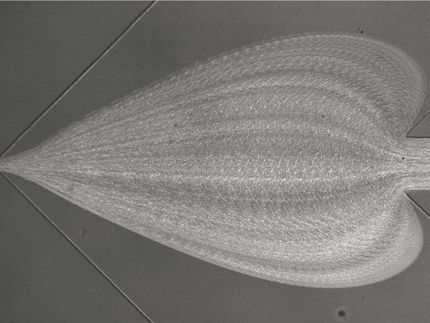Nanoparticles help with malaria diagnosis
New rapid test in development
malaria is caused by parasites transmitted by mosquito bite. The most dangerous form of malaria is Malaria tropica. Left untreated, it is fatal in most cases. An early diagnosis is vital for the timely and right kind of therapy. There are five different types of parasites at the origin of the disease. Plasmodium falciparum is causing malaria tropica and it is particularly harmful for infants and pregnant women in the African sub-Saharan region.
To diagnose malaria with conventional diagnostic tools and to identify the parasite causing the infection takes experienced and well-trained personnel and a well-equipped laboratory. Both are scarce in Africa or even anywhere else outside specialized health care centers.
That is the reason why the NanoFRET project partners come together to develop the whole blood rapid diagnostic test to detect just this special type of parasite. Funding is granted by the German Federal Ministry of Education and Research (BMBF) within the framework of the VIP+ program (“Validation of the innovation potential of scientific research”).
In the body, infectious germs produce large amounts of specific proteins that accumulate in the blood. These proteins will be detected by a new tool developed by the project consortium led by the project coordinator Dr. Rolf Fendel (University of Tübingen). At the Fraunhofer IME, the team around Dr. Torsten Klockenbring sets out to develop antibodies able to identify proteins from the malaria parasite. These antibodies are coupled to novel fluorescent nanoparticles, which Dr. Sofia Dembski and her “Theranostik” team – part of the Translational Center Regenerative Therapies –developed at the Fraunhofer ISC.
The detection of the pathogen in a blood sample will be based on a special technique (time-resolved fluorescence resonance energy transfer (TR-FRET) in combination with the antibodies and the nanoparticles.
However, there is one challenge to overcome: The fluorescent properties of the nanoparticles have to be adapted so that the autofluorescence of blood can not affect the result.
Testing will take place with samples from malaria patients and a non-infected control group. Samples will be gathered, characterized and used to define the test parameters. The study will be performed by Dr. Andrea Kreidenweiss from the Institute of Tropical Medicine (University of Tübingen) at the Centre de Recherches Médicales de Lambaréné (CERMEL) located in Gabon, a collaboration partner of long standing.
In a next step upon establishing a reliable method, it will be tested in a diagnostic study at the CERMEL. The evaluation will consider sensitivity, specificity, and practicability under real conditions. If the test proves to be suitable, the project partners will design a prototype kit. The test kit must be producible at low cost and should enable an early diagnosis with malaria tropica.
The project is planned to be completed by late 2019. If successful, the project partners will adapt the test method to other infectious diseases and then find industry partners to develop the next generation of rapid diagnostic tools.
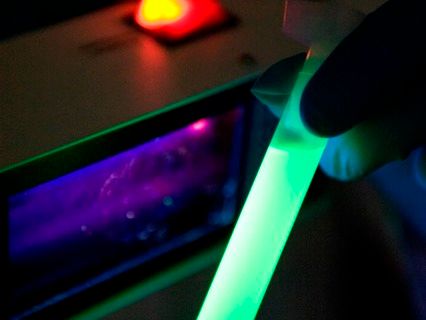
Fluorescent nanoparticles, excited by UV light.
© Foto K. Dobberke für Fraunhofer ISC
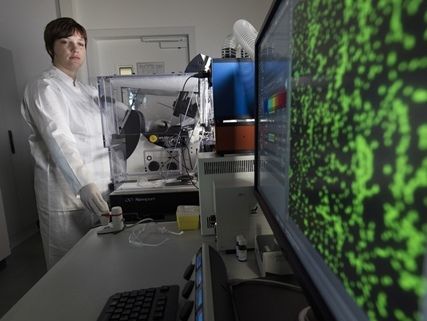
The spectrometer shows the dye’s fluorescent signal in the excited state.
© Foto K. Selsam, Fraunhofer ISC
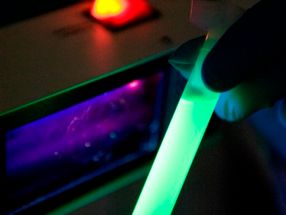
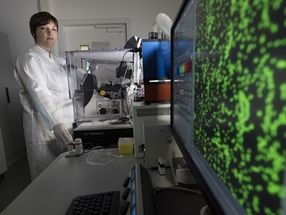
Most read news
Topics
Organizations
Other news from the department science

Get the analytics and lab tech industry in your inbox
By submitting this form you agree that LUMITOS AG will send you the newsletter(s) selected above by email. Your data will not be passed on to third parties. Your data will be stored and processed in accordance with our data protection regulations. LUMITOS may contact you by email for the purpose of advertising or market and opinion surveys. You can revoke your consent at any time without giving reasons to LUMITOS AG, Ernst-Augustin-Str. 2, 12489 Berlin, Germany or by e-mail at revoke@lumitos.com with effect for the future. In addition, each email contains a link to unsubscribe from the corresponding newsletter.
Most read news
More news from our other portals
Last viewed contents

A Record Year for ZEISS - In fiscal year 2020/21, ZEISS achieves highest revenue yet in its 175-year history at 7.5 billion euros

Nanophoton Raman Microscopes | Raman microscopes | Bruker
Agilent Technologies Partners with China Environmental Centre to Detect Toxins in Water and Soil
Biotage AB joins forces with MultiSynTech GmbH and enters the peptide synthesis business

